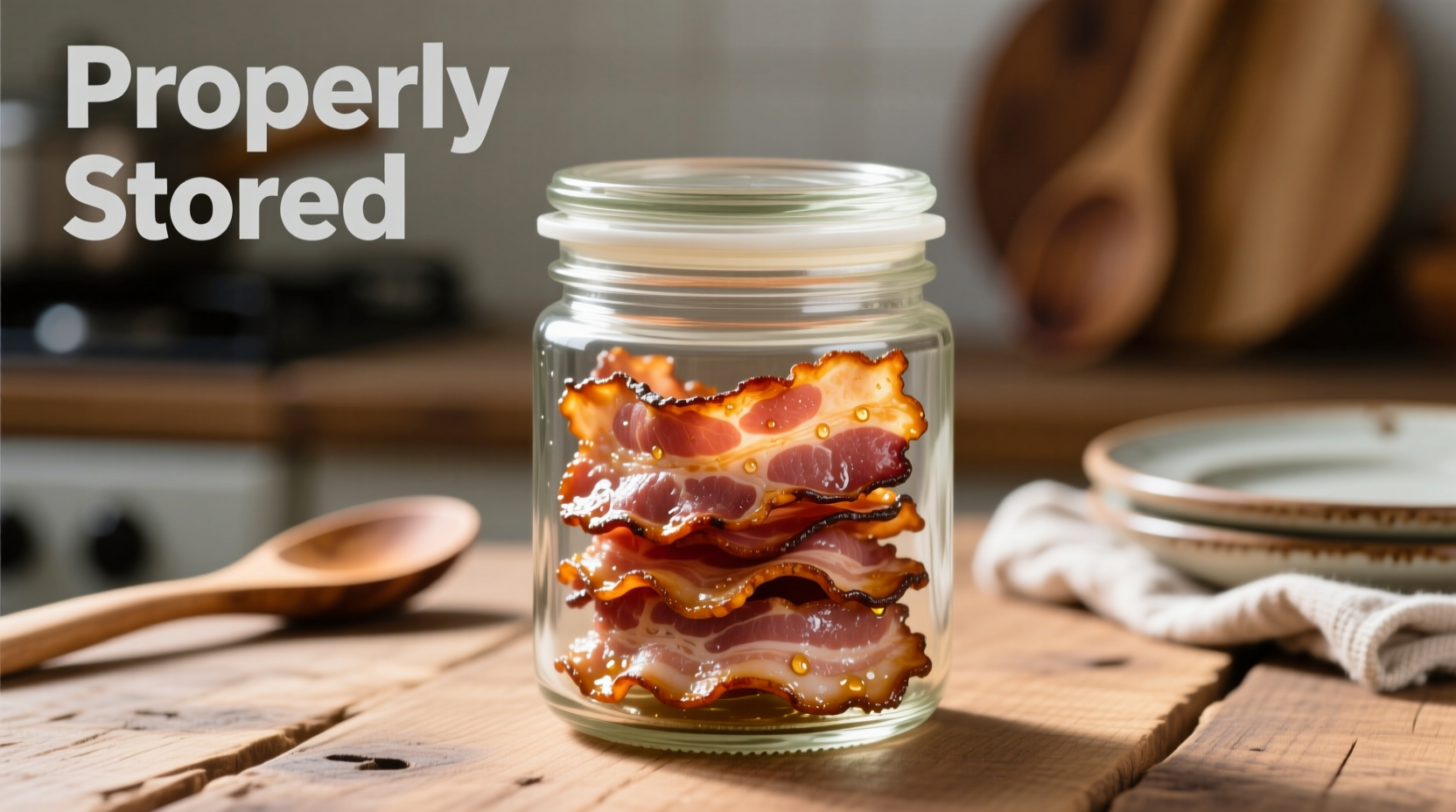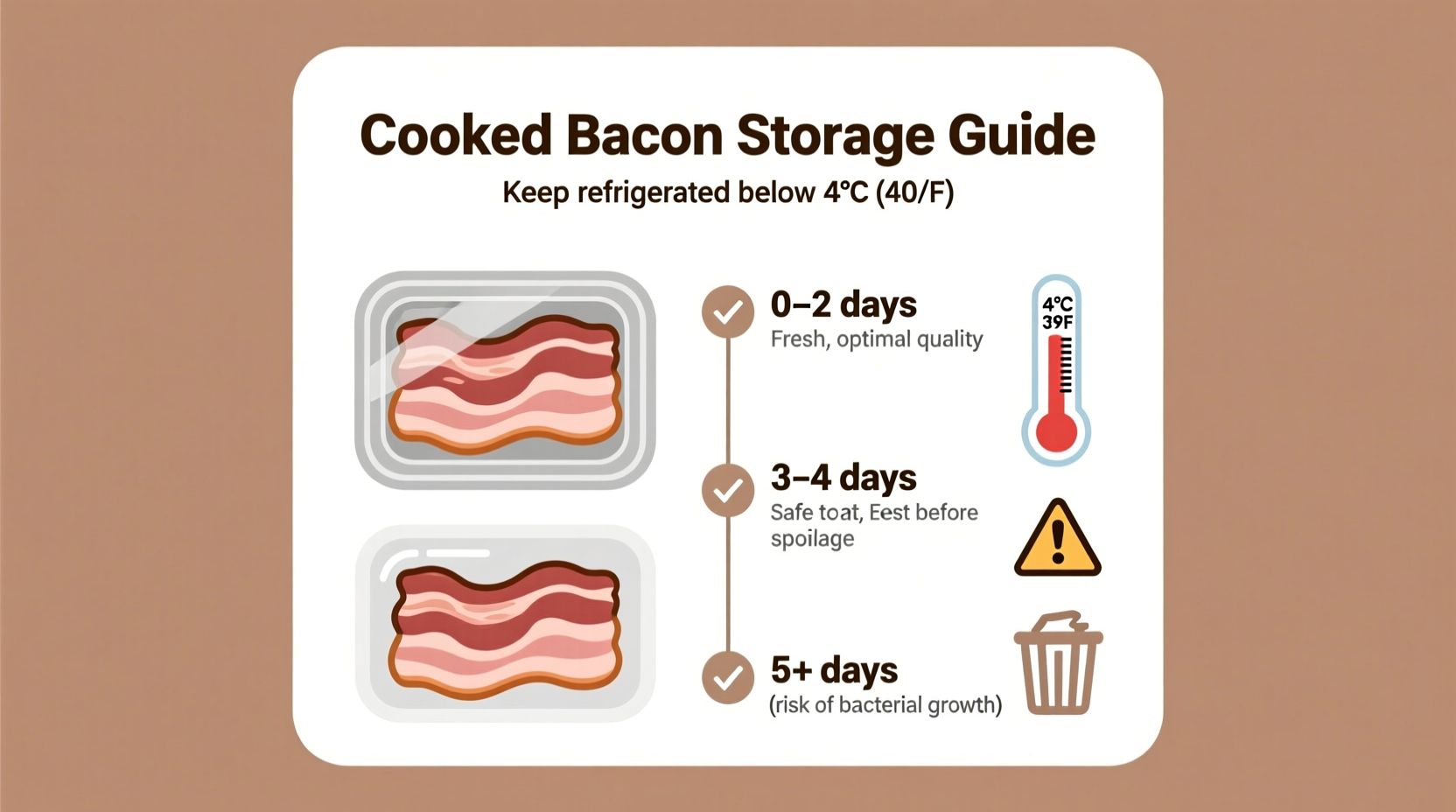Cooked bacon stays safe in the refrigerator for 4-5 days when properly stored in an airtight container at or below 40°F (4°C). This timeframe comes directly from the USDA Food Safety and Inspection Service, the leading authority on food storage guidelines in the United States.
Nothing ruins a perfect breakfast like discovering your carefully cooked bacon has gone bad. Whether you've batch-cooked for meal prep or simply have leftovers from Sunday brunch, knowing exactly how long cooked bacon remains safe in your refrigerator prevents both food waste and potential illness. This guide delivers science-backed storage recommendations you can trust, with clear indicators to help you determine when it's time to toss that bacon.
Why Proper Cooked Bacon Storage Matters
Cooked bacon contains moisture and fats that create an ideal environment for bacterial growth when left at unsafe temperatures. According to the USDA Food Safety and Inspection Service, cooked meats like bacon enter the "danger zone" (40°F-140°F) where bacteria multiply rapidly. Proper refrigeration slows this process significantly, but doesn't stop it completely.
Consuming spoiled cooked bacon can lead to foodborne illnesses caused by bacteria like Staphylococcus aureus or Clostridium perfringens, resulting in uncomfortable symptoms including nausea, vomiting, and diarrhea. Following evidence-based storage guidelines protects your health while maximizing your investment in quality bacon.
Maximizing Freshness: Your Cooked Bacon Storage Timeline
The 4-5 day refrigerator shelf life for cooked bacon isn't arbitrary—it's based on extensive food safety research. Here's what happens during this critical window:
| Time Period | Quality Status | Microbial Activity |
|---|---|---|
| 0-2 days | Peak freshness, crisp texture | Minimal bacterial growth |
| 3-4 days | Good quality, slight softening | Noticeable but safe bacterial levels |
| 5 days | Borderline safety, texture deteriorates | Approaching unsafe levels |
| 6+ days | High risk of spoilage | Potentially dangerous bacterial counts |
This timeline assumes your refrigerator maintains a consistent temperature of 40°F (4°C) or below. The Centers for Disease Control and Prevention emphasizes that even brief temperature fluctuations can accelerate spoilage. Use a refrigerator thermometer to verify your appliance's actual temperature, as built-in dials often provide inaccurate readings.

Step-by-Step: Storing Cooked Bacon for Maximum Shelf Life
How you store your cooked bacon directly impacts how long it remains safe to eat. Follow these professional kitchen-tested steps:
- Cool completely before storing – Never place warm bacon directly in the refrigerator. Allow it to cool on a wire rack for 15-20 minutes until it reaches room temperature.
- Remove excess grease – Blot cooked bacon with paper towels to reduce moisture that accelerates spoilage.
- Use airtight containers – Transfer bacon to rigid containers with tight-fitting lids or heavy-duty resealable bags, removing as much air as possible.
- Store in the coldest part of your refrigerator – Typically the back of the lower shelf, not the door where temperatures fluctuate.
- Label with date – Use masking tape to note the storage date—"cook date + 4 days" provides a clear expiration reference.
When Cooked Bacon Storage Time Varies: Critical Context Factors
While the standard 4-5 day guideline applies to most situations, these factors can shorten or extend your cooked bacon's safe storage period:
- Cooking method matters – Oven-crisped bacon generally lasts longer than pan-fried due to more thorough fat rendering
- Bacon thickness – Thick-cut bacon contains more moisture and may spoil slightly faster than regular cut
- Storage container quality – Vacuum-sealed containers extend freshness compared to standard containers
- Refrigerator temperature consistency – Units maintaining exactly 35°F provide 1-2 extra days versus those at 39°F
- Added ingredients – Bacon cooked with sugars or syrups may spoil faster due to increased moisture retention
Freezing Cooked Bacon: Your Long-Term Solution
When you need to store cooked bacon beyond 5 days, freezing is your best option. Properly frozen cooked bacon maintains quality for 1-2 months. Here's how to freeze it correctly:
- Arrange cooled bacon strips in a single layer on a parchment-lined baking sheet
- Flash freeze for 1-2 hours until solid
- Transfer to freezer bags or vacuum-sealed containers, removing all air
- Label with contents and date
- Store at 0°F (-18°C) or below
Thaw frozen cooked bacon overnight in the refrigerator—never at room temperature. For best results, reheat in a 350°F oven for 5-7 minutes to restore crispness without overcooking.
How to Spot Spoiled Cooked Bacon: 5 Warning Signs
When in doubt, throw it out. These unmistakable signs indicate your cooked bacon has spoiled and should be discarded immediately:
- Visible mold – Any fuzzy spots (white, green, or black) mean immediate disposal
- Off-putting odor – Sour, fishy, or rancid smells indicate bacterial growth
- Slippery or sticky texture – Fresh cooked bacon should be crisp or chewy, not slimy
- Color changes – Significant fading or unnatural greenish hues signal spoilage
- Unpleasant taste – If it tastes off—stop eating immediately and discard the remainder
The USDA emphasizes that "when foods look or smell unusual, it's better to be safe than sorry." No amount of reheating can destroy all toxins produced by spoilage bacteria.
Common Questions About Cooked Bacon Storage
Understanding proper cooked bacon storage prevents both food waste and potential illness. When you follow these evidence-based guidelines, you'll enjoy perfectly crisp bacon every time while keeping your kitchen safe. Remember: when storing cooked bacon in the refrigerator, 4-5 days is your absolute maximum—and proper storage techniques can help you reach that full window without compromise.











 浙公网安备
33010002000092号
浙公网安备
33010002000092号 浙B2-20120091-4
浙B2-20120091-4